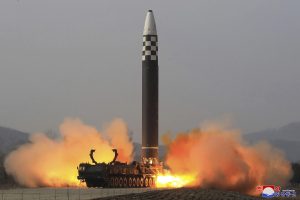North Korea fired one intercontinental ballistic missile (ICBM) off its east coast, South Korea’s Joint Chiefs of Staff (JCS) said on Friday.
The missile flew about 1,000 km with a maximum altitude of 6,100 km and was launched from the Sunan area of Pyongyang around 10:15 a.m. KST.
Condemning the North’s ICBM launch, the South’s JCS called it “a grave provocation harming the security and stability of not only the Korean Peninsula but also the international community.” It also added that it will keep maintaining a firm military readiness posture against any provocations from the North through close coordination with the U.S. military.
After having a summit with Spanish Prime Minister Pedro Sanchez, South Korean President Yoon Suk-yeol ordered his staff members in the National Security Council to strengthen South Korea-U.S. combined defense readiness and trilateral security cooperation with the United States and Japan, according to Yoon’s office. He also ordered measures to strengthen the executability of the extended deterrence against North Korea, as agreed between the South and the United States.
Hours after the North’s ICBM launch, Seoul published a government statement. It said that any acts related to North Korea’s nuclear and ballistic missile programs cannot be justified. The statement also warned that the North should not misjudge as South Korea has an overwhelming corresponding capability and will act to immediately punish the North’s provocations.
Calling the North’s ICBM launch “a brazen violation of multiple U.N. Security Council resolutions,” Washington also strongly condemned the North’s ICBM launch and reiterated its full commitment to defend its allies – Seoul and Tokyo – from Pyongyang’s provocations.
“The United States will take all necessary measures to ensure the security of the American homeland and Republic of Korea and Japanese allies,” Adrienne Watson, a spokesperson for the White House’s National Security Council, said in a statement. Watson also reiterated that “the door has not closed on diplomacy” but urged the North to “immediately cease its destabilizing actions and instead choose diplomatic engagement.”
North Korea has remained silent over Washington’s offers of dialogue since U.S. President Joe Biden took office in January 2021. Pyongyang is still stung by a failed summit between then-President Donald Trump and North Korean leader Kim Jong Un in 2019.
As North Korea’s previous Hwasong-17 ICBM launch conducted on November 3 seemed to have failed after the second stage separation, Pyongyang may have tested this missile again on Friday. According to experts, the ICBM tested on Friday seemed to have succeeded in the second stage separation, but it has not been confirmed whether the missile also successfully reentered the Earth’s atmosphere.
Friday’s missile launch came a day after the North launched a short-range ballistic missile (SRBM) toward the waters off its east coast on Thursday. This SRBM flew about 240 km with an altitude of 47 km and was launched from the Wonsan area of Gangwon Province around 10:48 a.m. KST.
Those successive missile launches of an ICBM and an SRBM came within two days after North Korea’s state media published a belligerent statement from Foreign Minister Choe Son Hui over the South Korea-U.S.-Japan trilateral summit that was held in Phnom Penh, Cambodia, on Sunday. Considering the timing of the North’s missile launches this week, North Korea is demonstrating that the United States’ extended deterrence cannot deter its missile tests but will destabilize the tensions on the Korean Peninsula further.
“The keener the U.S. is on the ‘bolstered offer of extended deterrence’ to its allies and the more they intensify provocative and bluffing military activities on the Korean peninsula and in the region, the fiercer the DPRK’s military counteraction will be, in direct proportion to it, and it will pose a more serious, realistic and inevitable threat to the U.S. and its vassal forces,” Choe said in her statement published in the North’s KCNA on Thursday. (DPRK is an acronym of the North’s official name: Democratic People’s Republic of Korea.)
When the North Korea-U.S. nuclear talks and inter-Korean dialogue were underway from 2018 to 2019, North Korea refrained from testing any ICBMs in a bid to advance the negotiations. Since the failed Hanoi summit with Trump, however, Kim Jong Un declared that he is no longer bound by his self-moratorium on nuclear and ICMB tests. North Korea resumed ICBM testing in March of this year.
Although North Korea is banned from developing and testing ballistic missiles under United Nations Security Council resolutions, that has not prevented it from repeatedly launching ballistic missiles. North Korea has launched numerous and various missiles this year and already broke the annual record for the number of its missile launches. Despite that, China and Russia, permanent members of the UNSC, have vetoed U.S. calls to impose additional sanctions on North Korea.
In the wake of Russia’s invasion of Ukraine and the Taiwan Strait crisis, North Korea is now reinforcing its ties with China and Russia, exploiting its strategic position in the region to confront the growing unity between the United States and its allies over Pyongyang’s missile threats. As Pyongyang has demonstrated that sanctions cannot completely preclude it from developing its nuclear and missile programs, the capabilities of North Korea’s missile programs will continuously go up unless the South and the United States devise a new policy to induce the North to step up for diplomatic engagement.
































